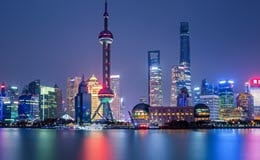The China Mistake
Trump’s administration says the U.S. erred in supporting China’s entry into the WTO.
"Market access challenges remain, but protectionist measures will only lead to retaliation by Beijing."
It was a mistake for the U.S. to support China’s membership into the World Trade Organization (WTO), and negotiating new trade deals with Beijing is a waste of time. That, at least, is the flawed view of the Trump administration’s Office of the U.S. Trade Representative (USTR).
In a January 2018 report, USTR declared that “the U.S. erred in supporting China’s entry into the WTO” and that high-level bilateral talks designed to advance market access “have largely failed.”
This is a remarkable change in perspective.
Just one year ago, the very same agency wrote that “data confirms a dramatic expansion in trade and investment among China and its many trading partners, including the U.S., since China joined the WTO,” noting that exports of American goods to China increased 500% since 2001, “positioning China as the U.S.’ largest goods market outside of North America.”
A year ago, during the Obama administration, USTR stated that after joining the WTO, “the Chinese government took many steps to implement China’s numerous commitments,” which “unquestionably deepened China’s integration into the WTO’s rules-based international trading system.” In 2017, USTR said that bilateral talks in the prior year had resulted in “significant progress” on a wide rate of “key trade and investment issues.”
China’s WTO Accession has Delivered
In my view, China’s 2001 entry into the WTO has delivered benefits to a wide range of both Americans and Chinese.
China’s inclusion in the WTO has been a boon to many American companies. During the 15-year period when U.S. exports to China rose by 500%, our exports to the rest of the world were up by only 90%.
Exports to China are especially important to American farmers. China is their largest overseas market and since China’s WTO accession, the value of U.S. agricultural exports to China has risen by 1,000%. Shipments of American soybeans, for example, rose by thirteen-fold.
While it is true that U.S. firms continue to battle against non-tariff barriers and nontransparent government regulatory policy in China, many American companies have done well in that market. Boeing, for example, has delivered more aircraft in China than in the U.S. over the last five years. The American Chamber of Commerce in China recently reported that nearly three-quarters of their member companies are profitable, the highest proportion in three years.
Exports to China Create American Jobs
You’ve probably read reports that imports from China led to 2.4 million U.S. job losses. But those jobs were lost over a more than 10-year period, while another study found that U.S. exports to China directly and indirectly supported 1.8 million new jobs in just one year, 2015.
Another overlooked point is that imports from China are good for American household budgets. A study by economists at the New York Fed and other institutions concludes that “U.S. consumers gained from China’s WTO entry through lower prices on varieties of manufactured goods.”
Structural Change in China
The Trump administration’s USTR report makes one other significant gaffe, claiming that “the state’s role in the [Chinese] economy has increased.” In fact, China’s WTO accession has driven structural changes in that country’s own economy, which have given Chinese people a better standard of living and more personal (although not yet political) freedom. The absence of political rights and the rule of law are serious long-term problems, but Chinese people have the freedom to run their own lives to a degree that was unimaginable just 25 years ago. And, in my view, continued expansion of personal freedom and wealth creation will inevitably lead to more political rights.
For many years, China’s economy was dependent on investment. Today, domestic consumption accounts for the majority of economic growth and more than half of GDP.
When I first worked in China during the early 1980s, there were no private companies. But small, entrepreneurial private firms now account for 85% of urban employment and all net new job creation.
Since 2001, per capita urban household income rose by 431% in China. As a result, spending by Chinese consumers—which was equal to only 27% of U.S. retail sales a decade ago —was equal to 90% of American consumer spending in 2017, and is likely to surpass U.S. retail spending by the end of the decade.
This has opened up opportunities for many publicly listed American companies. General Motors sells more vehicles in China than it does in the U.S., and China accounts for about 20% of GM’s global earnings. China contributes 19% of Apple’s revenue. Nike shoe sales in China rose 19% over the last quarter and accounted for about 15% of total revenue. China contributes roughly 15% of global earnings for firms such as Nvidia, Dolby and Tesla.
Challenges Remain, but Engagement will Deliver More than Protectionism
Despite all of this progress, many challenges remain. China, for example, continues to restrict market access for foreign firms in sectors such as technology, pharmaceuticals, financial services and accounting. The Trump administration should focus on this, rather than on reducing the U.S. trade deficit with China. The trade deficit has little impact on U.S. employment and is determined by balances between savings and investments, rather than by trade policy.
Protectionist policies by the Trump administration would not further open Chinese markets for U.S. firms. Rather, such steps would lead to retaliation, which would reduce U.S. exports and harm the many American jobs they support. Protectionism would hurt American families, because imports have resulted in more affordable prices for many consumer goods.
Andy Rothman
Investment Strategist
Matthews Asia
As of January 29, 2018, accounts managed by Matthews Asia did not hold positions in General Motors, Boeing, Apple Inc., Nike, Inc., Nvidia Corporation, Dolby Laboratories, Inc. or Tesla, Inc.



